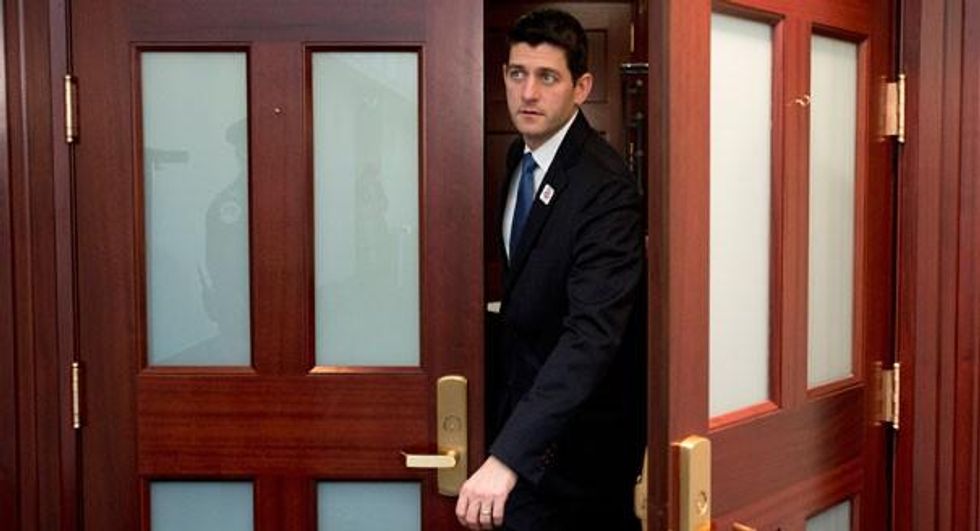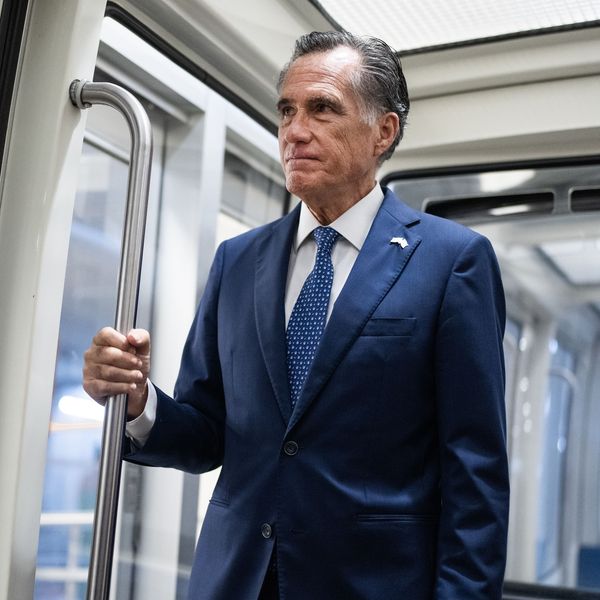Paul Ryan's Regressiveness Redux
Republicans lost the election but they still shape what's debated in Washington -- the federal budget deficit and so-called "fiscal responsibility."

The White House's and the Democrat's continuing failure to reshape that debate has lead directly and logically to Paul Ryan's budget plan this week, which is a more regressive version of the same plan American voters resoundingly rejected last November.
Sadly, the President is playing into the GOP's hands with a new round of negotiations over a "grand bargain."
Despite February's encouraging job numbers, the major challenge is still jobs, wages, growth, and widening inequality -- not deficit reduction and fiscal responsibility.
We'd need numbers like February's every month for the next four years to get anywhere close to the level of unemployment we had before the Great Recession. But we won't get there because of the austerity policies the nation has embarked on, and the continuing erosion of the middle class.
Austerity economics -- of which Ryan's upcoming budget is the most extreme version -- is a cruel hoax. Cruel because it hurts most those who are already hurting; a hoax because it doesn't work.
The entire framework is based on the false analogy that the federal budget is akin to a family's budget.
Families do have to balance their budgets. But that's precisely why the federal government has to be the spender of last resort when consumer spending falls short of boosting the economy toward full employment.
And as long as income and wealth continue to concentrate at the very top, the broad middle class and those aspiring to join it won't have the purchasing power to boost the economy.
So why even try for a "grand bargain" that won't deal with these fundamentals but only further legitimize the GOP mythology and further mislead the public about what's really at stake?
An Urgent Message From Our Co-Founder
Dear Common Dreams reader, The U.S. is on a fast track to authoritarianism like nothing I've ever seen. Meanwhile, corporate news outlets are utterly capitulating to Trump, twisting their coverage to avoid drawing his ire while lining up to stuff cash in his pockets. That's why I believe that Common Dreams is doing the best and most consequential reporting that we've ever done. Our small but mighty team is a progressive reporting powerhouse, covering the news every day that the corporate media never will. Our mission has always been simple: To inform. To inspire. And to ignite change for the common good. Now here's the key piece that I want all our readers to understand: None of this would be possible without your financial support. That's not just some fundraising cliche. It's the absolute and literal truth. We don't accept corporate advertising and never will. We don't have a paywall because we don't think people should be blocked from critical news based on their ability to pay. Everything we do is funded by the donations of readers like you. Will you donate now to help power the nonprofit, independent reporting of Common Dreams? Thank you for being a vital member of our community. Together, we can keep independent journalism alive when it’s needed most. - Craig Brown, Co-founder |

The White House's and the Democrat's continuing failure to reshape that debate has lead directly and logically to Paul Ryan's budget plan this week, which is a more regressive version of the same plan American voters resoundingly rejected last November.
Sadly, the President is playing into the GOP's hands with a new round of negotiations over a "grand bargain."
Despite February's encouraging job numbers, the major challenge is still jobs, wages, growth, and widening inequality -- not deficit reduction and fiscal responsibility.
We'd need numbers like February's every month for the next four years to get anywhere close to the level of unemployment we had before the Great Recession. But we won't get there because of the austerity policies the nation has embarked on, and the continuing erosion of the middle class.
Austerity economics -- of which Ryan's upcoming budget is the most extreme version -- is a cruel hoax. Cruel because it hurts most those who are already hurting; a hoax because it doesn't work.
The entire framework is based on the false analogy that the federal budget is akin to a family's budget.
Families do have to balance their budgets. But that's precisely why the federal government has to be the spender of last resort when consumer spending falls short of boosting the economy toward full employment.
And as long as income and wealth continue to concentrate at the very top, the broad middle class and those aspiring to join it won't have the purchasing power to boost the economy.
So why even try for a "grand bargain" that won't deal with these fundamentals but only further legitimize the GOP mythology and further mislead the public about what's really at stake?

The White House's and the Democrat's continuing failure to reshape that debate has lead directly and logically to Paul Ryan's budget plan this week, which is a more regressive version of the same plan American voters resoundingly rejected last November.
Sadly, the President is playing into the GOP's hands with a new round of negotiations over a "grand bargain."
Despite February's encouraging job numbers, the major challenge is still jobs, wages, growth, and widening inequality -- not deficit reduction and fiscal responsibility.
We'd need numbers like February's every month for the next four years to get anywhere close to the level of unemployment we had before the Great Recession. But we won't get there because of the austerity policies the nation has embarked on, and the continuing erosion of the middle class.
Austerity economics -- of which Ryan's upcoming budget is the most extreme version -- is a cruel hoax. Cruel because it hurts most those who are already hurting; a hoax because it doesn't work.
The entire framework is based on the false analogy that the federal budget is akin to a family's budget.
Families do have to balance their budgets. But that's precisely why the federal government has to be the spender of last resort when consumer spending falls short of boosting the economy toward full employment.
And as long as income and wealth continue to concentrate at the very top, the broad middle class and those aspiring to join it won't have the purchasing power to boost the economy.
So why even try for a "grand bargain" that won't deal with these fundamentals but only further legitimize the GOP mythology and further mislead the public about what's really at stake?

